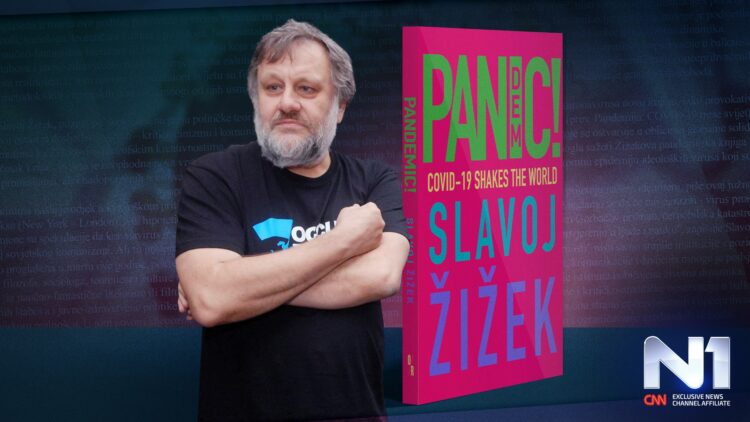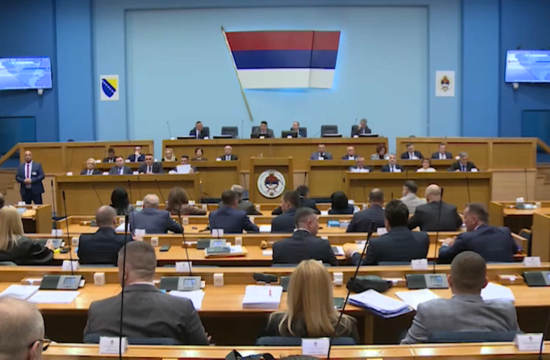
The novel coronavirus pandemic, officially declared in March this year, has started an avalanche of reactions: not only were the institutions of power and public healthcare system targeted by the comments and analyses of “a new social reality” but also individual dissonant voices of philosophers, sociologists, theorists on culture and psychologists.
The new social lockdown and full change towards new practices in work, communication and life, in general, reminded the many of the dystopias from science-fiction literature and film, which changed overnight from the surreal to the real life that was deprived of ordinary routine. In the “new” and “unknown” (post)pandemic world, many philosophers focused on criticism over the abuse of power and authorities, which was followed by the restriction of citizens’ freedoms.
Introduction into new communism?
Slavoj Žižek, the world-renowned philosopher of Slavic origin, published a new book amid the pandemic. Titled ‘Pandemic: Covid-19 Shakes the World’, the book by Slavoj Žižek could become a new platform – especially for the leftists, for a new reflection on alternative society – outside the nation-state; the society that is achieved in the forms of global solidarity and cooperation. And in order not to have the pandemic become a global nightmare and “the beginning of the end”, the world needs a new kind of what is called communism: although not the best, this could be the briefest summary of Žižek's book. A continuous spread of coronavirus, according to this famous philosopher, has launched a huge epidemic of ideological viruses that – as he noticed and cleverly described – were sitting idle in our societies: fake news, paranoid conspiracy theories, explosions of racism.
Žižek hypothetically sets a though that another and much benevolent ideological virus might spread and hopefully infect all of us – the virus of thought of alternative society.
“Speculation is widespread that coronavirus may lead to the fall of Communist rule in China, in the same way, that, as Gorbachev himself admitted, the Chernobyl catastrophe was the event that triggered the end of Soviet Communism. But there is a paradox here: coronavirus will also compel us to re-invent Communism based on trust in the people and in science,” said Slavoj Žižek on the 39th page of his new book.
The virus affecting all classes
The world can no longer follow the same path, according to the philosopher: we need to pave the way for new, more radical changes. He also refers to Frederic Jameson (American philosopher and Marxist political theorist), who many years ago pointed at the utopian potential in the films about cosmic catastrophes such as asteroids that threaten the life on Earth or a virus that destroys the humankind:
“Such a universal threat gives birth to global solidarity, our petty differences become insignificant, we all work together to find a solution—and here we are today, in real life. This is not a call to sadistically enjoy widespread suffering insofar as it helps our Cause—on the contrary, the point is to reflect upon the sad fact that we need a catastrophe to be able to rethink the very basic features of the society in which we live,” said Žižek.
A day after Iran’s deputy health minister, Iraj Harirchi, appeared at a press conference in order to downplay the coronavirus spread and to assert that mass quarantines are not necessary, he made a short statement admitting that he has contracted the coronavirus and placed himself in isolation (even during his TV appearance, he had displayed signs of fever and weakness) – described (see pages 41-42) the intriguing philosopher with origins in Slovenia.
Harirchi added: “This virus is democratic, and it doesn’t distinguish between poor and rich or between the statesman and an ordinary citizen.”
Žižek wrote: “In this, he was deeply right—we are all in the same boat. It is difficult to miss the supreme irony of the fact that what has brought us all together and promoted global solidarity expresses itself at the level of everyday life in strict commands to avoid close contacts with others, even to self-isolate” (Pandemic: Covid-19 Shakes the World).
Žižek's new book is yet to echo in philosophical and academic communities and, no doubt, it will become another bound playground for long discussions among the supporters of his ideas and those – usually from liberal positions, categorically opposing Žižek. For now, the book was translated into several languages, still without a translation into our language, as well as a few critical reviews including the one by Yohann Koshy published in The Guardian, where the journalist concludes: “In countries where there are fewer ventilators than cabinet members, where social distancing in crowded slums is impossible, where debt repayments to western creditors are set to rise, where there are no powerful central banks to issue bonds that investors will trust, Žižek’s “communism” means little.”




